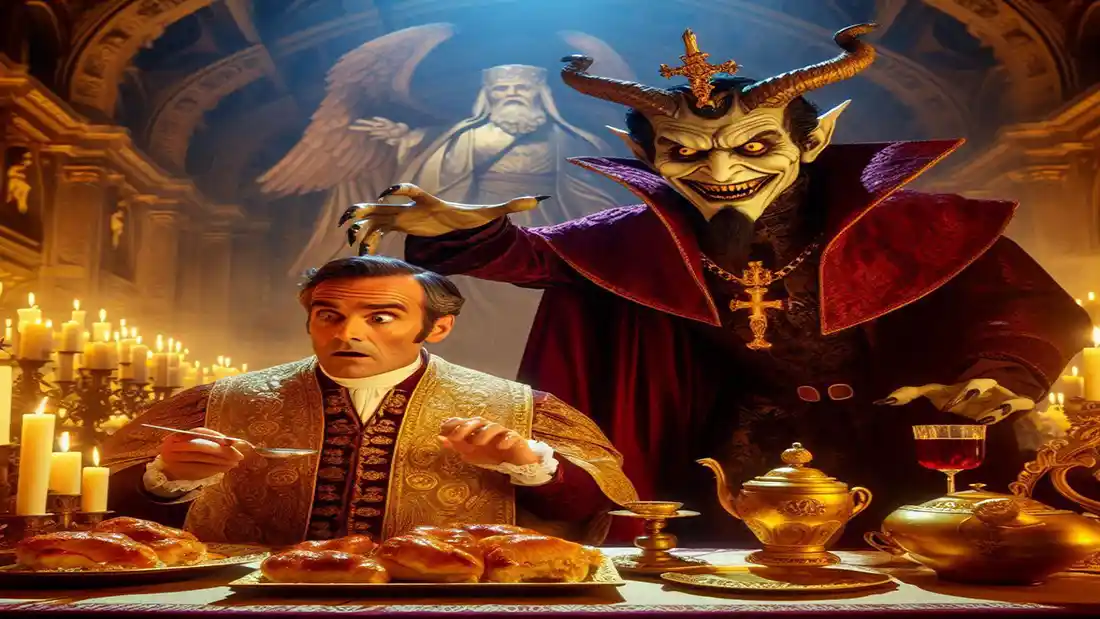Welcome to BD JOBZ PREPARATION! If you are studying Christopher Marlowe’s Doctor Faustus, you have come to the right place. Act 3 of this legendary play takes us deeper into Faustus’s journey after he makes his fateful pact with the devil. This act is particularly fascinating as it showcases Faustus’s use of magical powers in Rome, his reckless arrogance, and his mockery of religious figures. But what does this mean for his fate? Let’s explore the key events and themes in Doctor Faustus-Act 3.
Read More: Doctor Faustus-Act 2 Summary
Doctor Faustus-Act 3 Summary

Christopher Marlowe’s play Doctor Faustus continues with Act 3, where we see the consequences of Faustus’s decision to sell his soul to the devil. This act is significant as it portrays Faustus’s exploration of the world with the help of Mephistophilis, his growing arrogance, and his eventual confrontation with religious figures. Throughout Doctor Faustus-Act 3, Marlowe presents themes of knowledge, power, and the limitations of human ambition.
The act begins with Faustus, having gained immense magical power, traveling the world with Mephistophilis. His journey is made possible by the demonic pact he signed in the previous acts. Faustus reaches Rome, one of the most influential cities of the time, and takes great interest in visiting the Pope’s court. He is fascinated by the wealth, grandeur, and religious influence that Rome holds. However, instead of using his knowledge for something meaningful, he decides to play tricks and entertain himself with his dark powers.
In Doctor Faustus-Act 3, Faustus and Mephistophilis use their magical abilities to enter the Pope’s private chambers unnoticed. They make themselves invisible, allowing them to move freely without being detected. Faustus, now arrogant and amused by his powers, decides to play pranks on the Pope and his attendants. While the Pope is dining with his cardinals, Faustus snatches food and wine from the table, making it appear as if the items are disappearing mysteriously. The Pope and his followers are terrified, believing that some supernatural force is at play.
Faustus takes his trick further by slapping the Pope. This act of disrespect highlights his disregard for religious authority and his descent into recklessness. The Pope and his attendants, convinced that they are being haunted by spirits, respond by performing exorcisms and prayers to drive away the evil forces. Instead of feeling remorse, Faustus finds their reactions amusing and continues to mock religious figures.
A significant moment in Doctor Faustus-Act 3 is the introduction of the friars who attempt to counter Faustus’s mischief with religious chants. However, Faustus and Mephistophilis respond by creating chaos, producing loud noises, and disrupting their prayers. This scene further emphasizes Faustus’s moral decline. Instead of using his power for wisdom or knowledge, he wastes it on meaningless pranks and disrespectful behavior. Marlowe uses this episode to illustrate Faustus’s inability to recognize the true value of his abilities.
As Faustus and Mephistophilis prepare to leave Rome, they take one last opportunity to mock the religious leaders. This act solidifies Faustus’s transformation from a scholar seeking knowledge to a man who misuses power for trivial entertainment. The audience is left questioning whether Faustus realizes the foolishness of his actions or if he is too blinded by arrogance to see his own downfall.
The significance of Doctor Faustus-Act 3 lies in its depiction of Faustus’s moral and intellectual decline. In the earlier acts, Faustus was portrayed as a man eager to gain unlimited knowledge and power. However, by Act 3, he has become a mere trickster, using his powers for cheap amusement rather than for noble or meaningful purposes. His visit to Rome is not used for intellectual pursuit but instead becomes an opportunity for mischief and mockery.
Additionally, this act serves as a turning point in the play. It shows how Faustus, who once sought to understand the universe, is now wasting his opportunities. His actions indicate that he is drifting further away from redemption. While he still has time to repent, his continued mockery of religious figures suggests that he is moving towards eternal damnation without realizing it.
Marlowe also uses Doctor Faustus-Act 3 to highlight the contrast between true wisdom and shallow arrogance. Faustus was once a respected scholar, but his behavior in this act reduces him to a mere jester. His journey, which should have been filled with intellectual discovery, turns into a series of foolish acts that contribute nothing to his growth or enlightenment. This transformation is a warning about the dangers of unchecked ambition and the misuse of power.
Read More: Doctor Faustus-Act 1 Summary
Act 3 of Doctor Faustus serves as a critical moment in the play, showcasing Faustus’s growing arrogance and moral decay. His journey to Rome, instead of bringing enlightenment, becomes a spectacle of childish tricks and disrespect toward religious figures. This act marks his steady downfall, as he wastes his demonic powers on petty amusement instead of achieving greatness. As the play progresses, the consequences of his actions will become more severe. Will Faustus ever realize the gravity of his choices, or is he destined for eternal damnation? Stay tuned for more insights on Doctor Faustus here at BD JOBZ PREPARATION!



